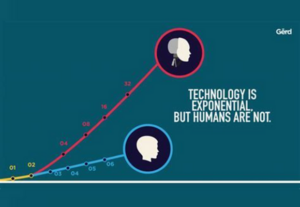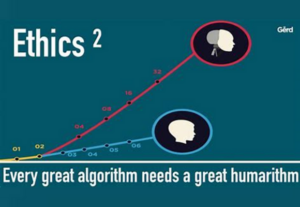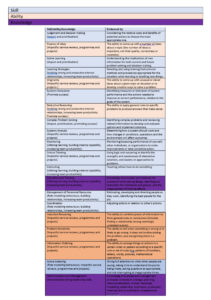Building business transformation capability is more important than ever before
Building business transformation capability is more important than ever before
8th August 2022, 2:15 pm
The fourth industrial revolution (4IR) ‘the fusion of digital, biological, physical words and the development of artificial intelligence, cloud computing, robotics, 3D printing, the internet of things and wireless smart solutions ‘has driven exponential technology advancement, this combined with the pandemic has seen the rate of change accelerate dramatically, leading us beyond 4IR to an even more digitally connected future.
Consumers and businesses have adapted to embrace digital change and this trend is set to continue and get faster.
Technology is Exponential, Humans are Not

Source: Gerd Leonhard, Futurist.
BUT, Every great algorithm needs a great humarithm

Source: Gerd Leonhard, Futurist.
What does this mean for business transformation.
Businesses need to become more fluid, building fit for future 21st century skills and capabilities that can help them constantly evolve and transform at a fast enough rate to keep up with technological advances.
Historically lots of businesses have embarked on their transformation programmes in a planned way, often identifying a ‘burning platform’ that triggers a need for change, spending time and often lots of money creating business cases and strategies to influence boards and investors that transformation is needed, finally when this is achieved the business then begins to attempt to engage its workforce with the transformation vision. One of fundamental questions businesses often fail to ask at the outset is ‘does my business have the right transformation capability, required to deliver our transformation vision’
Without the right transformational capability, business transformation will not succeed. According to McKinsey 70% of business transformation programmes fail with one of the main causes not being inadequate technology, but the lack of transformation capability across the organization.
‘Contributing factors include insufficiently high aspirations, a lack of engagement within the organization, and insufficient investment in building capabilities across the organization to sustain the change, among others’.
Source: McKinsey.
Futureproofing transformation teams with 21st Century Skills
21st century skills, abilities and types of knowledge are those that need to be developed and retained, they are essential to be successful in new ways of working that have emerged and developed during 4IR.
Key facts
- The future of work is being reimagined and reinvented due to the move towards a more remote workforce during/post the coronavirus pandemic.
- By 2025 more employees will work on a hybrid work schedule, AI and machine learning will transform hiring, and innovation teams will be more global.
- A recent McKinsey & Co. global survey shows a corporate push towards automation; the shift to remote work or hybrid remote workforces; an increase in the use of freelancers, and growing reliance on artificial intelligence and machine learning tools to manage the workforce and other key functions.
- Companies are prototyping new HR models to keep up with this rapid pace of change. Some are embracing artificial intelligence and automation to keep operations on an even keel, gather data-driven insights about their employees, improve the talent search and manage global risk.
In practice case study, extract from CISCO CEO
“AI and machine learning is helping us better understand how our people think and work,” Katsoudas notes. “It’s helped us develop perks to incentivize our employees, find pools of hidden talent around the globe and develop new ways to stimulate innovation.”
“We are learning new ways to collaborate and team build,” Katsoudas says. As she explains, data analytics is being used to form teams and identify the best talent for projects across the organization. One thing the company has found is that like-minded workers gravitate towards each other, aided by technology, sparking bubbles of innovation.
Just as important, AI has helped Cisco make breakthroughs in hiring and talent development. “Now we are doing what we call ‘blind hiring’, where we don’t see the name or the university the candidate attended. It’s helped eliminate bias and lets us just review the purity of a person’s work. This has opened up a whole new pool of talent we can tap — individuals who may not have a college degree but are skilled at coding and a host of other expertise.”
How does this translate into the future talent strategy and pipeline for business transformation teams.
It is becoming more important than ever that colleagues develop a mix of social and cognitive skills, (21st century skills).
21st Century skills are particularly relevant to those teams responsible for driving change and transformation within businesses:
Top social skills include teaching (instructing), adjusting to others’ actions (co-ordination), assessing others’ performance (monitoring) and providing motivation (management of personnel resources). Top cognitive skills include coming up with multiple ideas (fluency of ideas), deriving novel solutions (originality) and understanding new information (active learning).
The 21st Century Skills Table below sets out information can inform the future talent strategy and capability pipeline (though the lens of business transformation).
The table helps to understand:
- Where to build, buy, grow talent to support change and transformation activity.
- The importance of using technology and data to identify and enable talent and build the knowledge share ecosystem.
- The importance of life long learning in the workplace.
- As computer technologies have displaced labour in routine tasks, they have also created new employment opportunities for workers with non-routine cognitive skills, such as creativity, and social and emotional skills.
- To remain competitive, workers will need to acquire new skills continually, which requires flexibility, a positive attitude towards lifelong learning and curiosity.
- Social and emotional skills can be equally – and in some cases even more – as important as cognitive skills in becoming a responsible citizen/colleague.

The Transformation Tribe offer tailor made training and transformation support for businesses who are undergoing transformation and are passionate about futureproofing their transformation capability.
Dominate This Year’s Clearing